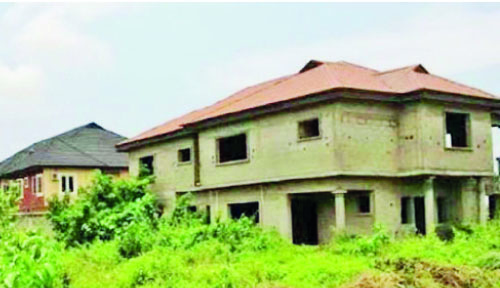Nigeria’s housing conversation usually begins and ends with a number 22 million units short tossed around like it tells the whole story. But numbers can lie, or at least, distract.
On the ground, the picture is twisted: towering condos shimmer over Lagos while families cram into one-room units with shared bathrooms and broken walls. Abuja glows with luxury estates for politicians, while their security guards sleep in wooden shacks a few meters away.
The Illusion of Progress
The official solution is always the same: unleash the market, build endlessly, let private developers save the day. But what’s being built — and for whom tells a different story. Glittering towers meant for investors sit empty while the people who cook, clean, drive, and hustle in these cities can’t even afford rent. The middle class is pushed into punishing mortgage deals, while people with low incomes are locked out entirely. It’s not a housing shortage it’s a housing mismatch.

A System Built for Exclusion
Related Posts:
- Nigeria's Housing Crisis: A 21-Million-Unit Deficit…
- Nigeria's Top 10 Most Expansive and Luxurious Estates
- GMH Luxury Investment Limited Set to Hold 3-Day…
- Abuja@30 Village: A Community plagued with abandoned…
- 5,000 Homes, Zero Residents: The Silent Housing…
- Public-Private Partnerships to Drive FG’s 100,000…
This isn’t just bad planning. It’s deliberate. Urban land is treated like a casino chip, not a place for people to live. Renters make up the majority in Nigeria’s cities, yet policies favor luxury developers and absentee landlords. The result? A landscape where the wealthiest stockpile property while millions live one eviction away from the streets.
The Dream of Homeownership
The dream of homeownership has become a mirage for most. Teachers, nurses, artisans they don’t need fancy condos or fake promises. They need homes close to work, within reach, with basic dignity. But as long as land is allocated for profit instead of purpose, these needs remain ignored. Even a million new estates in Lekki won’t make a dent unless affordability is addressed head-on.
Colonial Legacy and Land Control
This broken system didn’t start today. It’s built on colonial foundations designed to keep power in the hands of a few. During British rule, Nigerian cities were segregated by design — leafy quarters for Europeans, overcrowded edges for locals. That same urban divide lives on. Post-independence governments kept the structure but changed the names. The 1978 Land Use Act handed governors control of land, accelerating dispossession under the guise of development. Now, wealthy elites gobble up communal land to build estates, while people with low incomes are told to wait their turn.
The Strain of Uncontrolled Growth
Colonial infrastructure still sets the boundaries of suffering. Drainage systems collapse under flooding in neglected neighborhoods. Cities designed for thousands now choke with millions. Climate change pushes even more people into urban slums, especially in the north. Add to that ethnic tensions and outdated laws, and you have a housing crisis that is as much political as it is structural.
The Housing Crisis Today
Today, 87 million Nigerians live in what global indices call “inadequate housing.” But it’s more than inadequate — it’s inhumane. And it’s not by accident. It’s the legacy of exclusion dressed up as development.
The Market Cannot Solve the Problem
The private market, for all its promises, isn’t equipped to solve this. Developers follow profits, not people. They chase areas with government infrastructure and build for buyers with offshore accounts. Property is hoarded for appreciation, not habitation. Landlords prefer shortlets to long-term leases. Affordable housing? That’s low-return, high-risk — a non-starter in the current system.
Housing as a Human Right
The tragedy is that housing has been reduced to a spreadsheet line. But shelter is a human right, not a financial product. It’s what allows people to thrive, raise families, dream, and build. And when you take that away — or make it unreachable — you don’t just create a housing crisis. You kill opportunity.
Rethinking Housing Policy
It’s time to rethink. Real solutions start with policy that prioritizes people: rental protections, social housing, public investment in infrastructure where low-income earners actually live. Government must stop playing landlord for the rich and start acting as caretaker for the many.
Building Cities for All
The road ahead isn’t easy. But the choice is clear: keep building cities for the few, or start shaping cities where everyone has a place to belong. Because the true crisis isn’t in how much we’ve failed to build — it’s in how little we’ve chosen to care.



